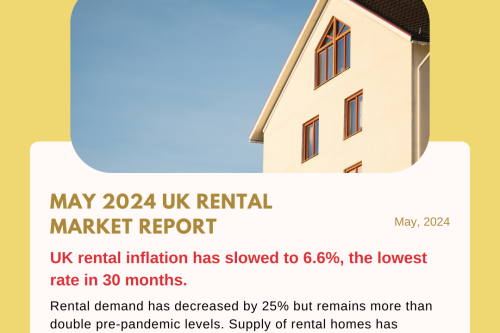- Free Valuation
- Competitive Sales Commission Fees
- Free Mortgage Advice

posted 11th June 2024
Executive Summary
Rental Inflation: UK rental inflation has slowed to 6.6%, the lowest rate in 30 months.
London's Impact: London leads the slowdown with a modest 3.7% increase in rents over the last 12 months.
Demand and Supply: Rental demand has decreased by 25% but remains more than double pre-pandemic levels. Supply of rental homes has increased by 18% but is still one-third below pre-pandemic levels.
Regional Variations: Rents have fallen in some cities over the last quarter as market dynamics begin to shift. There is still headroom for rental growth in the most affordable areas.
Policy Implications: It's crucial for political parties to propose specific policies to increase the size of the private rented sector to address the supply-demand imbalance.
Rental Inflation Trends
Annual Rate: The annual rental inflation for new lets in April 2024 was 6.6%, down from 10% a year ago. The average UK monthly rent increased to £1,226, up by £80 from the previous year.
Quarterly Trends: The underlying rate of inflation over the last three months, on an annualized basis, is 3%, indicating a continued slowdown in rental inflation for the rest of 2024.
Demand and Supply Dynamics
Demand: Rental demand has slowed significantly, with a 25% decrease over the past year. Despite this, competition for rental homes remains high, with 15 households chasing each rental property, compared to the pre-pandemic average of six.
Supply: The supply of homes for rent has increased by 18% over the past year. However, it remains one-third lower than pre-pandemic levels due to low investment in the rental sector.
Regional and City-Level Variations
London: London has seen the most significant slowdown in rental inflation, with average rents rising by only 3.7% over the last year, down from over 13% the previous year. Some inner London areas even experienced negative growth.
Other Regions: The highest rental increases were recorded in the North East (9.5%) and Scotland (9.3%). Rents fell slightly in several cities including Nottingham, Brighton, York, Glasgow, Cambridge, and London in the last quarter, reflecting shifting market dynamics.
Affordability and Earnings
Growth Comparison: While rents for new lets have been rising faster than average earnings since October 2021, the gap is beginning to narrow as rental inflation slows.
Regional Affordability: The proportion of gross earnings spent on rent is at its highest for a decade, particularly in regions like London where rental costs are highest. In contrast, regions like the North East and Scotland, where rental costs are lower, are seeing faster rental increases.
Investment and Policy Outlook
Investment Trends: Investment in the private rented sector remains low, with many private landlords continuing to sell their properties. This trend has kept the overall stock of private rented homes broadly flat since 2016.
Policy Needs: Addressing the supply-demand imbalance requires political commitment to boosting the supply of private rented housing. Specific policies aimed at increasing investment in the sector are essential for sustainable growth and improved affordability.
Comparative Regional Data
UK-Wide Trends: Average private rents increased by 8.9% in the 12 months to April 2024, with regional variations in inflation rates.
England: Rents increased by 8.9%, reaching an average of £1,293.
Wales: Rents rose by 8.2% to an average of £730.
Scotland: Rents saw a 10% increase, averaging £952.
Northern Ireland: Rents increased by 10.4% up to February 2024.
House Prices
Annual Increase: Average UK house prices increased by 1.8% in the 12 months to March 2024, marking the first annual increase since June 2023.
England: House prices increased by 1% to an average of £299,000.
Wales: Prices rose by 1.3% to £214,000.
Scotland: Prices saw a significant increase of 6.7%, reaching £192,000.
Northern Ireland: House prices increased by 4% to £178,000 in Q1 2024.
Conclusion
The UK rental market is experiencing a notable slowdown in rental inflation, influenced by a modest rise in supply and a significant decrease in demand. However, the demand remains significantly higher than pre-pandemic levels, maintaining upward pressure on rents. Affordability issues are becoming more pronounced, particularly in high-cost areas like London. To address these challenges, targeted policies to boost rental housing supply are essential. The outlook suggests continued moderate demand and slow improvements in the supply-demand balance.






